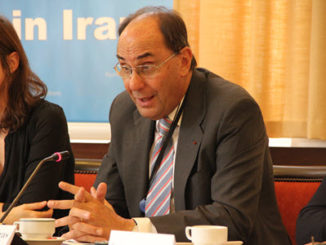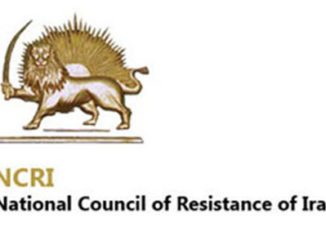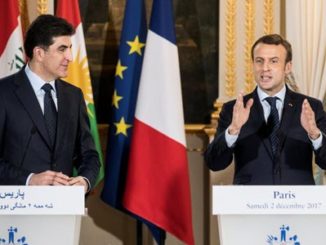FoxNews: Today, the Islamic State controls just three percent of Iraq after controlling one-third of the country two years ago, but American officials say an old nemesis in the region continues to stoke tensions inside the country, creating another immediate challenge once ISIS is defeated.
After the fall of the oil-rich city of Kirkuk and the evacuation of Kurdish fighters, the U.S. military must figure out how to keep Iraq from breaking apart while also preventing Iran from turning its neighbor into a proxy state.
“Nearly every threat to peace and security in the Middle East is connected to Iran’s outlaw behavior,” U.S. Ambassador to the United Nations Nikki Haley said Wednesday.
The Shia-led government in Baghdad welcomed Iran’s help when ISIS swept through Iraqi cities three years ago. Now Iran is flexing its muscle in Iraq, putting the U.S. in the middle of a potential three-way civil war involving Shias, Sunnis and Kurds.
“Now the Iranians are going to start demanding that we leave Iraq, that we leave Syria and the whole region becomes essentially a vassal state of theirs just like Lebanon has become,” said James Jeffrey, U.S. ambassador to Iraq from 2010-2012.
The head of U.S. forces in the Middle East issued a similar warning in Washington today.
“Iran has expressed its desire to build a large influence both literally in developing the Tehran-Beirut axis, and figuratively by increasing military and political influence in Syria, Yemen, Iraq and other places around the region,” said Army Gen. Joseph Votel, commander of U.S. Central Command.
U.S. military commanders on the ground have to be more diplomatic to avoid antagonizing Baghdad, whose permission they need to stay in Iraq.
In a briefing to Pentagon reporters from Baghdad, Army Col. Ryan Dillon said he saw no evidence Iran played a role in pushing Kurdish fighters out of Kirkuk on Monday, even though photos and videos emerged on social media of a Shiite Iraqi commander, Abu Mahdi al-Muhandis — who maintains close ties to Iran and has been sanctioned by the Treasury Department since 2009 — taking part in the flag-raising ceremony after Iraqi forces moved in.
Photos taken in Kirkuk also showed the shadowy Iranian Maj. Gen. Qasem Soleimani, leader of Tehran’s proxy forces in the Middle East. Soleimani is also sanctioned by the U.S. government, in part due to his involvement in the attempted assassination of then-Saudi Arabian ambassador to the United States Adel Al-Jubeir outside a popular Washington, D.C. restaurant in 2011.
At the U.N. Wednesday, Haley acknowledged it was not the first time as she encouraged the Security Council to enforce existing resolutions designed to halt Iran’s support for proxies.
“[U.N. Security Council] Resolution 2231 … bans travel outside of Iran for senior Iranian officials, including Maj. General Sulemani, and yet the Secretary General’s report lists multiple press photos of the general travelling to Syria and Iraq. You can even find photos on social media of him visiting Russia. This is an open and direct violation of [resolution] 2231, and yet where is the outrage of this council?”
The Pentagon steered clear of blaming Tehran earlier this week as Iraq took back the city and adjacent oil fields, which the Kurds had relied on as a key revenue source since 2014.
Despite reports that dozens of Kurdish troops were killed when the Iraqi military stormed Kirkuk Monday, the U.S. military says it is aware of only one minor skirmish, which was based on a “misunderstanding.”
“What we have seen is a peaceful handover of areas around Kirkuk,” said Dillon, a U.S. military spokesman for the international coalition to defeat ISIS. “It was a coordinated effort between Iraqi security forces and the Kurdish security forces that were there and they handed over the keys.”
The State Department also refused to acknowledge the possibility that any role in the Kirkuk offensive was played by Iran.
“As we watch the situation unfold in Iraq, we continue to call for calm, to call for calm on the part of the Kurds, on the part of the government in Baghdad as well. We have made no bones about that,” said State Department spokeswoman Heather Nauert Tuesday.
Nauert said Secretary of State Rex Tillerson was making calls to leaders in the region to defuse the crisis.
Kurdish forces had held Kirkuk since 2014, after the ISIS fight began. The Iraqi government decided to take the city back after the Kurds held a referendum on independence last month.
Iran’s deputy U.N. Ambassador, Gholamali Khoshroo, rejected any suggestion that Tehran is playing a nefarious role, blaming what he called, “the hostile policies of the United States and its regional allies, especially the Zionist regime, that have turned the region into a tinderbox.”
A year ago Monday, Kurdish Peshmerga fighters teamed up with Iraqi forces to kick ISIS out of Mosul, Iraq’s second largest city. Now those two U.S. allies have turned on each other, and many U.S. officials blame Iran.
Jennifer Griffin currently serves as a national security correspondent for FOX News Channel . She joined FNC in October 1999 as a Jerusalem-based correspondent. You can follow her on Twitter at @JenGriffinFNC.




